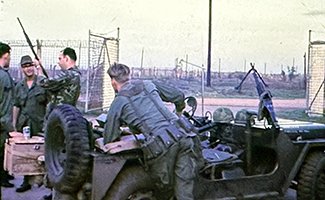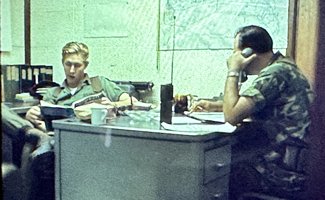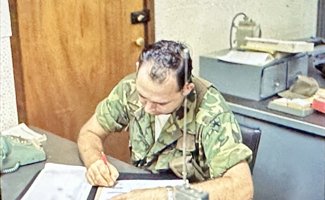Mac Was My Hero. I Never Told Him. I’m Sure He Never Knew.
William (Mac) McKissick was my hero. I never told him that. I am sure he never knew. We were not friends. The best that can be said is that we served together in the Air Force in Vietnam for about nine months.
He was a technical sergeant at the time, an air policeman responsible for the security of the northern perimeter of Tan Son Nhut Air Base just north of Saigon in Vietnam from six p.m. to six a.m. each night.
There was no fencing for most of that part of the base, just a point where the base sort of ended and rural Vietnam began. There was a road, but the base existed on either side at different points. There were several military facilities scattered somewhat haphazardly north of the east-west runways at Tan Son Nhut. My site was next to a massive bomb dump and favorite target of Viet Cong sappers. There were construction equipment and repair depots, the mortuary, dog kennels, a small arms firing range, and several other sites whose purpose I never knew.

Mac, second from left, showing one of Ed Meagher’s men his shotgun. Photo courtesy of the author.
My small site consisted of two one-story cinder block buildings with tin roofs, a two-seater outhouse, two large diesel generators, and a large sandbag bunker. An eight-foot-tall chain-link fence with barbed wire on top encapsulated it. There were two gates and a small courtyard. An antenna farm with a dozen or so very large, very tall, phased array antennas sat next door, practically crying out, “Please blow me up.”
I was in charge there each night from six p.m. to six a.m. along with 16 other radio operators, radio and antenna technicians, and diesel engine mechanics.
I was a 21-year-old newly minted staff sergeant, a victim of my upbringing and education. I was brought up to always do my best, never ask questions, and always obey authority. I was educated by the good nuns and brothers of the Catholic madrasa, so I had a firm grasp of reading, writing, and arithmetic and was trained to listen, remember, practice, and regurgitate—all keystones of success in the military. So I was promoted rapidly and slotted for small unit command.
Technically, I was prepared for the job. Mentally and emotionally, though, not so much. I was a young 21-year-old, if that isn’t an oxymoron. Perhaps better to say I was young even for a 21-year-old. As far as leadership ability, I faked it. I could give an order in six different ways, but I only parroted what I had heard others do and say. I didn’t own any of it. Emotionally, it was much worse. I was a terrified little boy who feigned bravery and indifference to death. Because I feared my real feelings would show through and expose me, I put up a pretty good tough-guy exterior. But it was all artifice.
The physical security for the north or Bravo perimeter at Tan Son Nhut consisted of three manned bunkers and two watchtowers. However, that left large swaths of open land unprotected. To fill in that area without putting up physical fortifications, the Air Force assigned dozens of young air policemen each with a sentry dog to patrol the spaces between the checkpoints during the day and assigned these teams to static positions at night.
The dogs were trained to go on alert when they detected motion or smells near their position. Their handler would then notify the quick reaction teams positioned nearby, and these teams would respond to that area.
This is where Mac came in. He was responsible for Bravo sector and would roam around all night in a convoy of three heavily armed jeeps with three men assigned to each vehicle. My site was centrally located in Bravo sector and Mac used it as his unofficial headquarters. We provided him a desk, a landline phone, access to a bottomless cup of coffee, and some protection from the rain. In return, he provided access to information about security around the base and, most importantly, in Bravo sector.
Each night around 7:30 p.m., Mac would position his three jeeps at the intersection of the road leading away from the kennels and where the various teams had to pass by on their way to their nightly assigned static positions. Mac knew every one of these young men and their dogs. He would inspect each of them as they passed by, inquire about the dog’s health, or question them about their assigned post. They exchanged friendly banter, talking about how many nights they had left in country. But he had an eagle eye for detail. Did they have the required ammunition clips, illumination rounds, and extra batteries for their radios? Were their dogs properly groomed and alert? He didn’t miss anything, and woe to any of them found wanting in some regard because he was a severe disciplinarian. You did not want to get chewed out by Mac.
He had bearing and presence. As these teams prepared to move by him you could see them straighten up and check themselves. He commanded respect, but just as important, he earned it. They trusted him quite literally with their lives. They knew that in the event of an alert, Mac and his quick reaction teams would be there no matter what.

Mac, right, was responsible for Bravo sector and would roam around all night in a convoy of three heavily armed jeeps with three men assigned to each vehicle. Photo courtesy of the author.
Mac was 31 years old and had spent 11 years in the Air Force. To a 21-year-old, he seemed like an old man. He would sit in our operations room at a desk against the wall and do his paperwork, all the while listening to the radio in front of him for the clicks and codes coming from the young men lying out in the grass or in little gullies with their dogs. He would tune a second radio to the base security network to listen for reports coming from the other security sectors. He would also have an ear cocked to one of our radios monitoring all the other bases around the country for reports of hostile activity.
I watched him like a hawk. He always seemed locked and loaded yet also strangely calm. When we came under attack from rockets or mortar rounds every one of us hit the deck—except for Mac. He listened and factored these rounds into his game plan.
He had names for various explosions. He called 105mm or 122m rockets one-eyed willies because they were nearly impossible to aim accurately and would land randomly, throw up a lot of dirt, make a lot of noise, and scare the hell out of the rest of us. But not Mac. He was a big believer in the notion that you would not hear the one that gets you, so don’t worry about the one you hear. Mortar rounds, on the other hand, commanded his full attention, and he waited for the second round to land so he could determine the direction and level of danger. Mortar rounds could be aimed and adjusted, and based on where the first one landed, succeeding ones could be corrected and “walked” to a target. He called these “grave diggers” or just “diggers.”
While we tried our best to blend into the floor, he listened and, if necessary, acted. If the rocket or mortar landed far enough away and we “flinched” or “ditched,” he laughed at us. If a rocket landed close enough, he told one of his crew to do a “lights-out” check of the sentry teams nearest where he thought it had landed. They would slowly proceed to that area in one of the jeeps with lights out so as not to give Charlie any guidance as to where their “one-eyed willy” had landed.
He could also tell, based on the alerts coming in, whether the dogs were set off by a Viet Cong infiltrator—or a rat or snake. How he did this I never understood, but he did. In any event, he would be out the door and on his way to that series of posts.
I only saw Mac lose his cool once. We had been under mortar attack for over an hour, and it seemed to him “Charlie” was trying for a hit on the bomb dump across the road from us. He advised us to move into our bunker and go to a bare-bones crew inside the operations room. Radio reception inside the bunker was terrible. While we waited for this little bombing session to end, Mac stood at the entrance just inside the blast wall with his radio in hand. I went back and forth across the 20 yards between the bunker and the operations room and often stood near him, listening to the clicks and having him explain them to me.
Award-Winning Journalism in Your Inbox
Apparently, two of his men sitting in the dark of the bunker came to realize that neither of them had brought the extra batteries for Mac’s radio—which they had been assigned to do. These batteries were terrible, clearly procured from the lowest bidder. Sometimes they leaked. You could charge them for eight hours and then they wouldn’t hold a charge, or they’d work fine one minute and then go dead without warning. Mac required everyone on his team to carry two extra batteries for themselves; he assigned several others to carry two for his own radio.
Rather than explain their failing to Mac, these two young airmen apparently decided it was much preferable to sneak out of the bunker under the wire and into a benjo, or sewer ditch, and out to a pickup truck that carried ammunition, fuel, rations, water, and all manner of other supplies for the sentry teams.
As I talked to Mac at the bunker entrance, he heard something in the ditch behind the bunker. Mac prided himself on knowing the exact whereabouts of every single man under his command. Mac was the first person to explain “situational awareness” to me. Knowing that none of his men should be in the benjo ditch outside our perimeter, Mac screamed, “VC in the ditch,” and like a cat dove out of the bunker, did a roll, and came up in a kneeling position with his M16 at the ready. One of the airmen in the ditch heard Mac yell and said, “Oh shit.” That saved their lives.

Mac doing paperwork with his radio in front of him. Photo courtesy of the author.
Mac went down to a prone position and shouted, “Who is in the ditch?” When they answered, he told them to show themselves with their hands up. They did, and their very bad, no good, awful, terrible night began. After they returned to the bunker and told their story, Mac went off. His anger only built as he chewed and chewed and chewed on them. It got worse when he realized he had cut and bruised his knee as he rolled out of the bunker and was bleeding. It went on for a little longer than an eternity, and he ended it with the ominous notice that he was not finished with the two of them.
After things calmed down and we returned to normal operations, I noticed Mac with his head in his hands a couple of times. Normally Mac was the epitome of calm under pressure. When things started to go squirrely, Mac grew calmer and calmer. It was clearly a learned behavior—and one I noticed the most and tried my best to emulate.
I noticed how Mac joined in the rough and tumble give and take of trash-talking among his men, but he only went so far before backing out. I learned that you can’t be a friend to anyone you might have to order into a dangerous situation. He knew he had to maintain “command distance” while building rapport with his troops. He could be demanding of his men and at the same time show them how much he cared about them.
I asked him questions in the middle of the night to gauge what frightened him so I might compare it to my level of fear, and he often answered with a frustrating shrug. Or he’d say, “You get used to it,” or, “What good does fear do you out here?” I observed him as closely as possible and slowly learned to “be like Mac.”
Our Journalism Depends on Your Support
And then one day he was gone. He had agreed to stay past his date estimated return overseas until his replacement arrived. He did not want to leave his men without a leader he could trust. His replacement showed up; Mac briefed him and then left on the next flight out. I never got to say goodbye or thank him or tell him how much he meant to me.
I suspect it would have been an awkward conversation. If it had occurred, it probably would have surprised him. But it never happened. I have carried the lessons I learned from Mac in the form of a question I ask myself whenever I find myself in a difficult situation. What would Mac do? The answer is almost always the same. Be calm and carry on. Take care of your people. And remember that you won’t hear the one that is going to get you.
This War Horse reflection was written by Ed Meagher, edited by Kristin Davis, fact-checked by Jess Rohan, and copy-edited by Mitchell Hansen-Dewar. Abbie Bennett wrote the headlines.





Comments are closed.